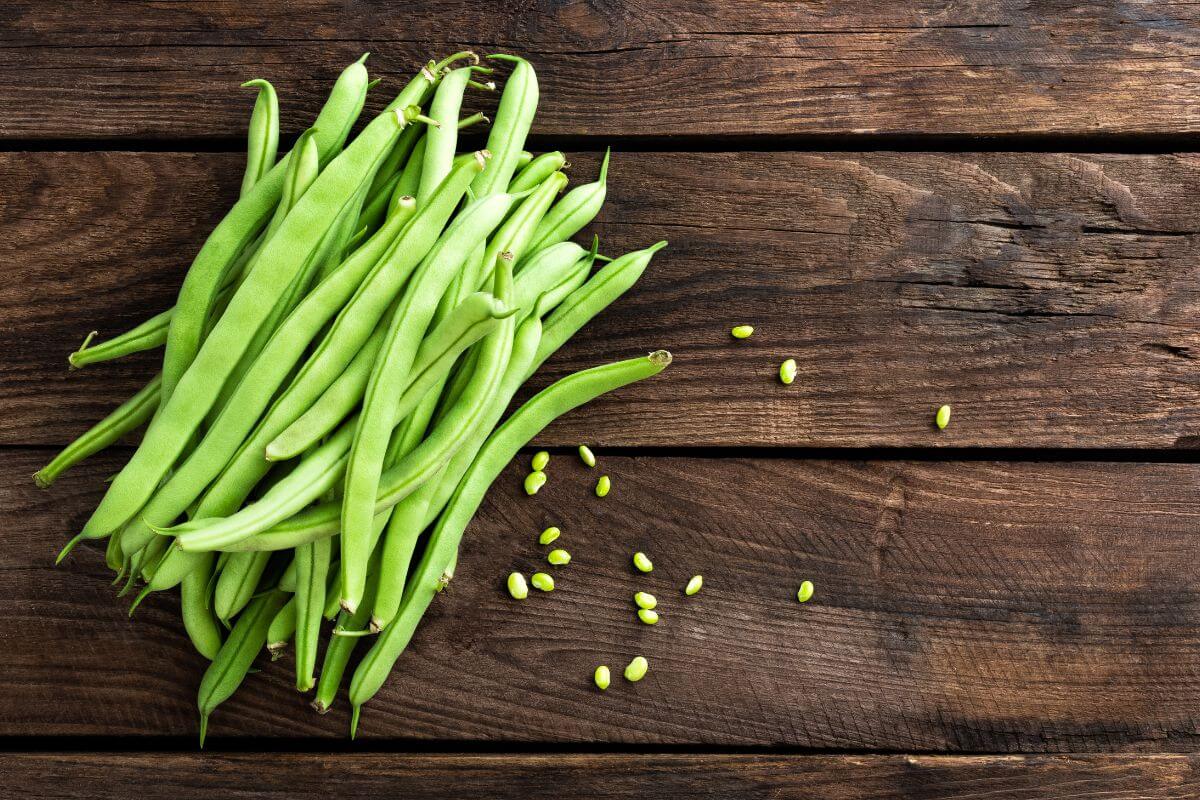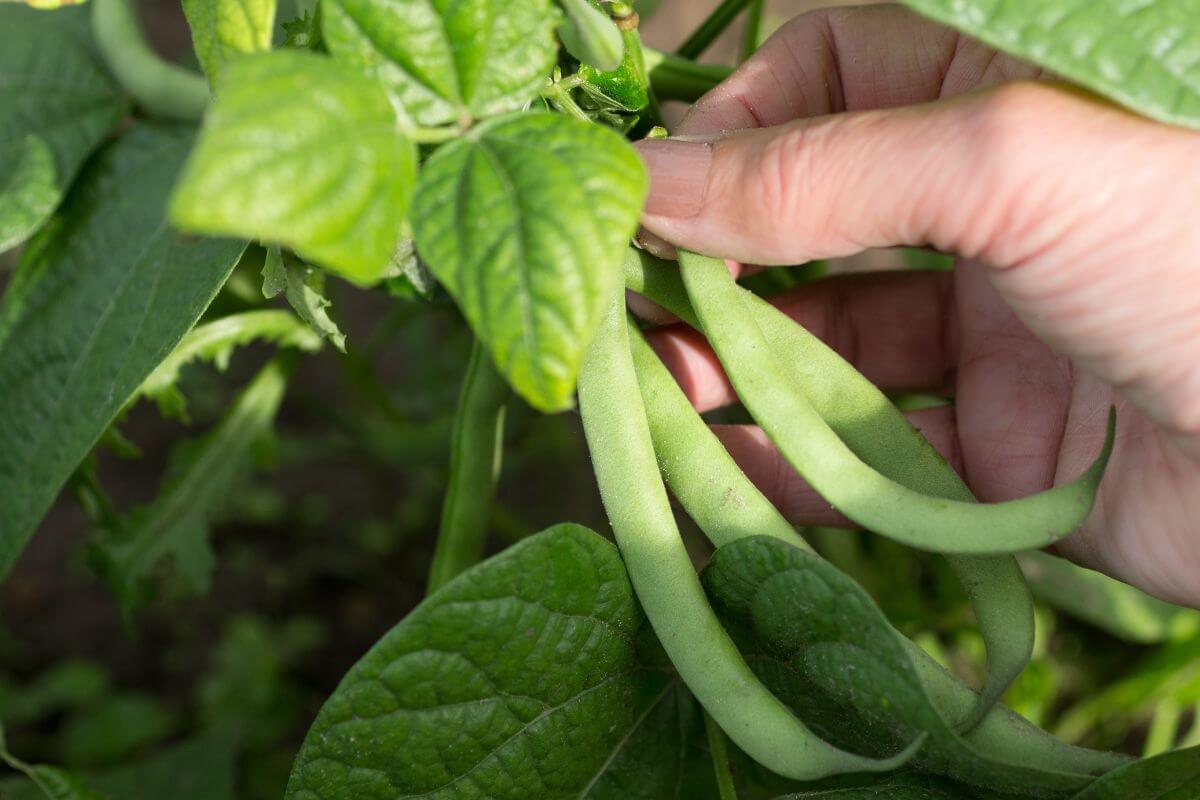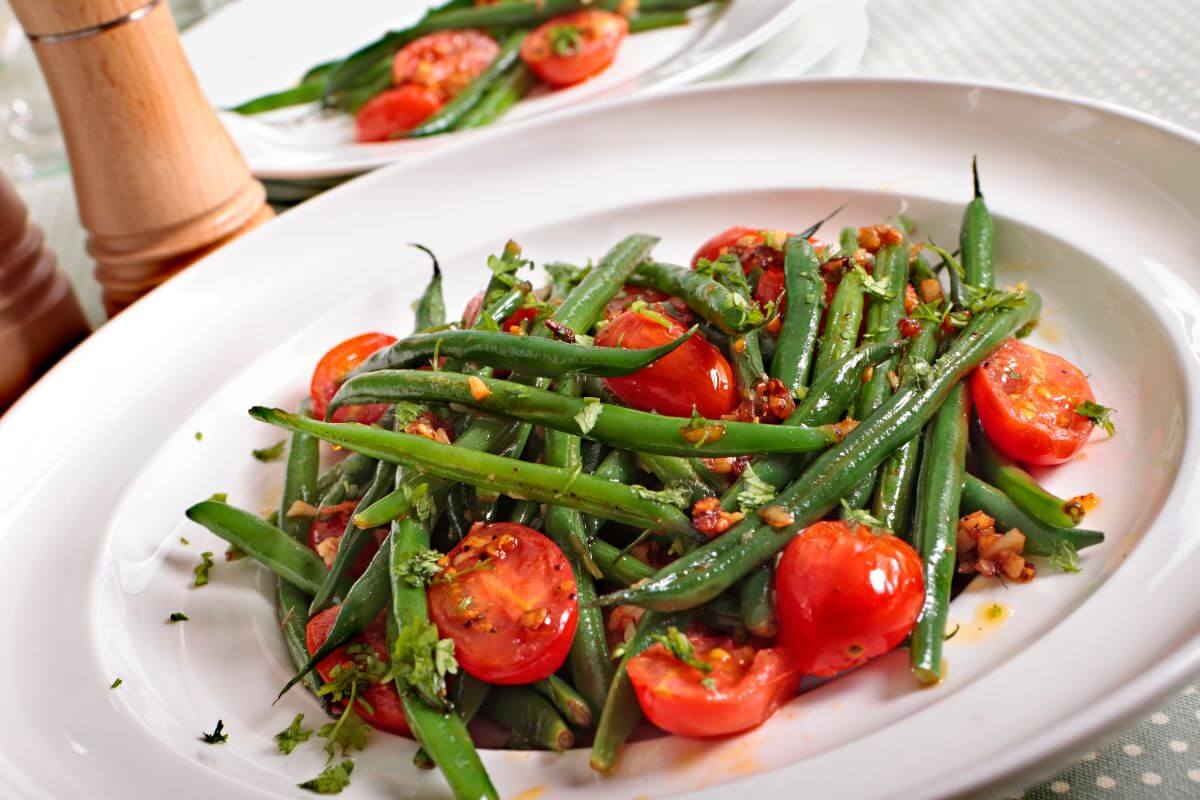Green beans are a tasty side dish loved worldwide. But are they really a veggie? Let’s dig into this garden mystery together!
You might think green beans are vegetables. I did too! But botanists see things differently. They’ve got a surprising take on these crisp, green pods.
I remember the surprise on my face when I first learned about this. It’s like finding out your favorite superhero isn’t who you thought they were. But don’t worry! Green beans are still packed with goodness, no matter what we call them.
Want to know the real scoop on green beans? Stick around! I’ll explore:
- What science says about green beans
- Why they might not be what you think
- The amazing health perks they offer
Trust me, by the end of this, you’ll be a green bean expert. And who knows? You might even impress your friends at your next dinner party with your bean knowledge!
- Related article: What Is the Difference Between a Fruit and a Vegetable?
Is Green Bean a Fruit or Vegetable?

Green beans are both fruits and vegetables. This depends on how you classify them. There are two ways to do this: botanical and culinary definitions.
Botanically, green beans are fruits. Culinary experts call them vegetables. That said, vegetables that grow from flowers are technically fruits.
If you’re growing kitchen gardens, understanding this can help you.
Why Are Green Beans Fruits?
Green beans are fruits because they fit the scientific definition of a fruit. They develop from the ovary of a flowering plant and contain seeds.
Green beans are pods with seeds inside. When they mature, the pods dry out and crack open. This reveals the mature bean seeds.
In nature, when the pod opens, the seeds fall to the ground. They then germinate and grow into new green bean plants. This natural process is why they are also called “dry fruit.”
Here are the key points that support the botanical definition of green beans:
- Green beans develop from the ovary of a bean plant flower. This is a key characteristic of fruits.
- Green beans contain seeds. These seeds are immature when harvested.
- Anything that develops from a plant’s ovary and helps in seed dispersal is considered a fruit.
- Green beans are reproductive parts of the plant, not integral parts like stems or leaves. This is different from vegetables, which are parts of the plant itself.
Why Are Green Beans Vegetables?
The generic definition of a vegetable is any part of a plant that’s edible. Plant parts include stems, leaves, roots, tubers, and fruits. In this sense, the green bean is also a vegetable. More specifically, the green bean is a starchy vegetable.
In the culinary world, green beans are treated as vegetables due to their savory taste and how they are used in cooking, similar to tomatoes and peppers. When green beans are served as a side dish to a steak or pork chop, they are considered vegetables.
Nutritionally, green beans are closer to non-starchy vegetables like lettuce and broccoli than to beans, peas, and lentils (pulses) which are dried and rehydrated before eating
Is the Green Bean a Legume?

Legumes are plants in the pea family, Fabaceae. They have pods with seeds inside. Green beans are part of this family.
You already know that green beans are both fruits and vegetables, but did you know they are also legumes? Fruits in the legume family are known as “dry fruits.” This can be confusing since legumes are used in savory dishes but produce fruits in pods.
You can find legumes easily in grocery stores. They are often dried and packaged as snacks. Common legumes include dried peas, lentils, black beans, kidney beans, pinto beans, and chickpeas.
Interestingly, green beans are not true beans. Common beans are edible seeds from specific plants. All beans are legumes, but not all legumes are beans.
What Nutrients Can You Get From Green Beans?
Green beans are not just for casseroles or side dishes. They are highly nutritious fruits packed with minerals and vitamins.
One cup of raw green beans gives you 12.2 mg of vitamin C. That’s about 25% of the daily value. Vitamin C is a powerful antioxidant that boosts your immune system and helps with skin health.
That same cup also has 690 IU of vitamin A, which is almost 15% of the daily value. Vitamin A is important for a strong immune system, good vision, and reproduction. Green beans also have vitamins B6, E, and K, plus niacin and thiamin.
Green beans are also rich in:
- Calcium
- Iron
- Magnesium
- Manganese
- Phosphorous
- Potassium
- Zinc
So, next time you eat green beans, remember they are not just tasty but also a powerhouse of nutrition.
What Are the Health Benefits of Green Beans?
Green beans are packed with nutrients and offer many health benefits. Let’s explore what these are.
1. Green Beans Help Protect Your Heart
Green beans pack a heart-healthy punch. They’re cholesterol-free, so they won’t clog your arteries. A cup of raw green beans gives you 2.7 grams of fiber. Cook them, and you’ll get 4 grams.
Some of this fiber is soluble. It helps lower LDL, the bad cholesterol. Green beans do more than that. They fight inflammation and keep your blood pressure in check. Plus, they’re low in sodium.
Here’s a quick look at how green beans boost your heart health:
- They’re rich in fiber (1 gram per half cup)
- They contain heart-friendly antioxidants
- They provide folate, which is important for your ticker
- They’re packed with vitamin K for artery health
- They’re a good source of lutein, which may slow plaque buildup
Green beans are loaded with antioxidants. These include vitamin C, flavonols, quercetin, and kaempferol. These little fighters take on free radicals. They reduce cell damage and may lower your risk of heart disease.
Did you know a cup of green beans gives you about a third of your daily folate? This nutrient is a heart health superstar. It may help reduce homocysteine levels. High homocysteine is linked to heart disease risk.
Let’s talk about vitamin K, which green beans have plenty of. This vitamin helps remove calcium from your blood vessels. It stops plaque from building up. It also protects your artery lining and keeps inflammation at bay. All this adds up to healthier blood pressure.
Ever heard of lutein? It’s a carotenoid found in green beans. Some studies suggest it might help reduce your risk of coronary heart disease. How? By slowing down plaque buildup in your arteries.
2. Green Beans Help Maintain Bone Health
Low vitamin K intake can lead to bone fractures. Vitamin K keeps bones healthy by helping with calcium absorption. One cup of green beans has about 14.4 mg of vitamin K. That’s around 20% of what you need daily.
Green beans are great for vitamin K. One cup gives you almost 20% of your daily needs. Vitamin K is key for bones. It changes bone proteins, helps absorb calcium, and lowers how much calcium you lose in urine.
While green beans don’t have as much calcium as dairy, they still offer some. One cup gives you 4% of your daily calcium needs. Eating green beans with other calcium-rich foods can boost bone density.
Green beans also have manganese, which helps build and keep bones strong. One cup has 0.258 mg of manganese. The fiber in green beans can also help bones by keeping you healthy and lowering body inflammation.
Fiber keeps blood sugar steady, which is good for bone metabolism. Green beans also have antioxidants like vitamin C, flavonols, quercetin, and kaempferol. These antioxidants fight free radicals that can harm bone cells and raise osteoporosis risk.
3. Green Beans Support Digestive Health

If you struggle with digestive issues like IBS or acid reflux, green beans can help. They also ease constipation, diarrhea, gas, and pain.
Green beans are low FODMAP food. This means they have carbs that are easier to digest, especially for those with IBS. Eating them can reduce symptoms like gas, bloating, and discomfort.
Green beans are high in fiber. A half-cup serving has about 1 gram of fiber. Fiber helps keep your bowel movements regular and prevents constipation. It adds bulk to stool and keeps your digestive system running smoothly.
The fiber in green beans also acts as a prebiotic. It feeds the good bacteria in your gut. This supports a healthy gut microbiome, which is important for digestive and immune health.
4. Green Beans Aid in Cancer Prevention
Green beans have a lot of chlorophyll. This helps stop the body from absorbing harmful substances like those in tobacco smoke and grilled meat. These substances can cause cancer.
They also have antioxidants that fight free radicals and reduce cell damage. This might lower the risk of some cancers.
Green beans are high in fiber. Fiber helps with regular bowel movements and reduces exposure to harmful substances. This might lower the risk of colorectal cancer.
Chlorophyll in green beans might slow down cancer tumor growth. It might also reduce the risk of cancer. But more research is needed to be sure.
Green beans contain inositol pentakisphosphate. This enzyme inhibitor has shown anti-cancer effects in lab studies. It blocks an enzyme called Phosphoinositide 3 kinase. This reduced tumor growth in ovarian and lung cancer in mice.
Inositol pentakisphosphate might also make cancer drugs work better. While more research is needed, eating green beans as part of a balanced diet might help reduce cancer risk.
5. Green Beans Provide Pregnancy Support

You might not realize it, but green beans are a powerhouse of nutrition, especially if you’re expecting. Let’s break down why they’re so good for you.
Green beans give you about one-third of your daily folate needs in just one cup. Folate is key for your baby’s growth and can help prevent certain birth defects.
They also have some non-heme iron. While it’s not a lot, every bit helps to prevent anemia and keep your baby’s oxygen supply steady.
The fiber in green beans can ease constipation and help regulate blood sugar. This is essential for both you and your baby.
Lastly, green beans offer a bit of calcium. It’s not as much as dairy, but it still helps build your baby’s bones and teeth.
So, next time you’re planning a meal, consider adding green beans. They’re more than just a side dish— they’re a nutritional boost for you and your baby.
Different Ways to Add Green Beans to Your Diet

Green beans are a versatile veggie you can enjoy in many ways. Let’s explore some tasty options to add them to your meals.
Want a quick and easy dinner? Try a stir-fry. Toss green beans with other veggies and your favorite protein. The beans stay crunchy and full of flavor.
Roasting brings out the natural sweetness of green beans. Here’s how:
- Toss beans with olive oil, salt, and pepper
- Add your favorite seasonings
- Roast at high heat until crispy and tender
Have an air fryer? You’re in for a treat. Air-fried green beans get a crispy, tempura-like texture. Just coat them in oil and seasonings, then air fry at 400°F for 8-10 minutes.
For a simple side dish, sauté green beans in a skillet. Add garlic, shallots, lemon, or nuts for extra flavor. It’s quick and delicious.
Chilled green bean salad is perfect for hot days. Here’s what to do:
1. Blanch beans in boiling salted water for 2-3 minutes
2. Shock them in an ice bath
3. Toss with vinaigrette, herbs, or feta
Remember green bean casserole? It’s not just for Thanksgiving anymore. Make it from scratch with sautéed mushrooms and onions. Or wrap beans in bacon for a fun twist.
Pickled green beans make a great snack or salad topping. Use a vinegar brine with garlic, dill, and spices. They’re tangy and crunchy.
Don’t forget to freeze some for later. Blanch and freeze green beans to add to soups and stews all year round.
The best part? You can mix and match these methods. Try different flavors and cooking styles. You’ll find your favorite way to enjoy this nutritious veggie in no time.
Is Green Bean a Fruit or Vegetable Final Thoughts
Green beans are a tasty surprise! They’re both a fruit and a veggie. How’s that possible? Well, they’ve got seeds inside, which makes them a fruit. But we use them like veggies when we cook. Cool, right?
Let’s not get hung up on labels though. The real magic of green beans is in their goodness. They’re packed with nutrients that’ll make your body happy. I love tossing them in stir-fries or steaming them for a quick side dish.
Have you ever tried them raw? They’ve got a satisfying crunch that’s perfect for snacking. And don’t get me started on green bean casserole during the holidays! It’s comfort food at its finest.
Whether you call them fruit or veggie, green beans deserve a spot on your plate. They’re versatile, delicious, and good for you. What’s not to love? Next time you’re at the grocery store, grab a handful and give them a try. Your taste buds (and your body) will thank you!
Learn more about vegetable vs fruit classification with these related articles:

